I have this code (the whole code is not important but can be seen on this link):
internal static class PlayCardActionValidator
{
public static bool CanPlayCard(...)
{
// ...
var hasBigger =
playerCards.Any(
c => c.Suit == otherPlayerCard.Suit
&& c.GetValue() > otherPlayerCard.GetValue());
// ...
}
}
After opening the code in decompiler (ILSpy) for example I noticed the existence of newly created class <>c__DisplayClass0_0 by the C# compiler:
This wouldn't be a problem for me if this code wasn't critical for the performance of the system. This method is called millions of times and the garbage collector is cleaning these <>c__DisplayClass0_0 instances which slows down the performance:
How can I avoid creating this class (his instances and their garbage collecting) when using the Any method?
Why does the C# compiler create this class and is there any alternative of Any() I can use?

